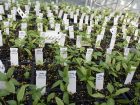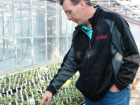
Features
Crops
Vegetables
Developing hardier, tastier greenhouse vegetables
January 9, 2015 By By Lilian Schaer of AgInnovation
Jan. 9, 2015, Vineland, Ont. — Imagine greenhouse tomatoes and peppers that look and taste great, grow well, and are disease-resistant too.
That’s what Daryl Somers and his team at the Vineland Research and Innovation Centre (Vineland) are currently working on.
“Differences in DNA sequences are called genetic variations and we do DNA analysis to determine which genes control the traits we want,” explains Somers.
“Every plant is different so our job is to connect those variations in the genes with specific traits – we call it genotype to phenotype.”
IDENTIFYING PRIORITY TRAITS
Vegetable crops are Somers’ major focus, particularly greenhouse tomatoes and peppers, where the industry has identified priority traits as disease resistance, flavour profiles, and how efficiently a plant will use the water, energy or nutrients it receives.
Here’s how it works: Somers’ team searches through existing plant and seed material – such as varieties developed at Vineland or germplasm from other collections, like Agriculture and Agri-Food Canada’s Greenhouse and Processing Crops Research Centre at Harrow, for example – to look for plants that naturally show some of these traits.
If they can’t find what they need, they can also induce genetic variation by first applying a solution to the seeds that can cause changes in their DNA, and then planting them.
FIRST TOMATOES, NOW PEPPERS
Somers’ work started with tomatoes and his team is now working with a population of approximately 3,800 pepper plants that are being grown in a greenhouse at Vineland.
“We started with 20,000 pepper seeds and now we have 3,800 plants. All the seeds are identical in the beginning,” says Somers. “When we soak the seeds, every seed changes in a different way.”
It’s Vineland’s DNA sequencer that then helps the team catalogue that plant population and identify the variations that the team is looking for.
Ultimately, the desired variations are bred into cultivars to help develop varieties that will become commercially available, but Somers says that is still several years away.
With tomatoes, for example, Vineland is currently working to increase seeds from the plants they’ve found with the most promising variations.
TEAMING UP WITH U OF T RESEARCHERS
They’ve also joined forces with Keiko Yoshioka and her team at the University of Toronto (U of T), who have discovered a key gene involved in plant disease resistance.
“They have identified a gene they know can create disease resistance, so it’s a perfect partnership as we start to focus on plants showing resistance to diseases like Botrytis and Clavibacter,” adds Somers.
Botrytis, a fungal disease also known as grey mould, and Clavibacter, a bacterial disease that causes bacterial canker, are both significant pathogens that can cause widespread crop loss, and greenhouse growers have made these pathogens a priority for research and mitigation.
The new collaboration with U of T just received funding from Genome Canada.
Somers’ work is also supported by the Ontario Greenhouse Vegetable Growers, Ontario’s Ministry of Research and Innovation, and Growing Forward 2, a federal-provincial-territorial initiative that provides investment in Vineland.
Somers is also working on rose genomics, and cucumbers and sweet potatoes are on the Vineland radar too.
CONSUMER INSIGHTS STUDY
As well, Vineland’s consumer insights team will help with profiling of traits like taste to ensure they’re growing and selecting what consumers like.
“Genomics will lead the bioeconomy, and food will in part be a product of genomics,” believes Somers.
Tomatoes, peppers and cucumbers generate more than $1 billion in annual sales for the Canadian greenhouse vegetable industry.
Lilian Schaer is with AgInnovation Ontario. This article is one in a series highlighting innovation in Ontario’s agri-food sector. AgInnovation Ontario is a project of the Agri-Technology Commercialization Centre (ATCC). The ATCC is funded by Growing Forward 2, a federal-provincial-territorial initiative. www.aginnovationontario.ca.
Print this page

